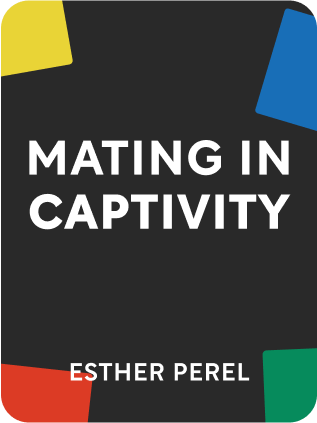

This article is an excerpt from the Shortform book guide to "Mating in Captivity" by Esther Perel. Shortform has the world's best summaries and analyses of books you should be reading.
Like this article? Sign up for a free trial here .
Are egalitarianism and sexual desire mutually exclusive? How do they contradict each other? How can we foster sexual equality when the act of sex itself is a power play?
According to Esther Perel, the author of Mating in Captivity, egalitarianism and sexual desire are inherently at odds with each other. Egalitarianism is all about fairness and respect, while sexual desire is driven by aggression and power play. However, this doesn’t mean that egalitarianism and desire have to be a balancing act.
Here’s what couples therapist Esther Perel has to say about sexual equality.
Esther Perel: Equality and Desire Don’t Have to Be a Balancing Act
Like security and intimacy, there is a fundamental conflict between egalitarianism and desire. Egalitarianism is based in fairness, respect, and compromise, while desire fundamentally thrives on obsession, aggression, objectification, and dominance. However, sexual equality is primarily about culture. As long as everything is consensual, you can dispense with egalitarianism in the bedroom in the pursuit of desire.
Stamping Out Power Imbalances
There are plenty of good reasons to try to neutralize power imbalances—crimes based in sex trafficking, violence, and child pornography being some of the most compelling examples. There was also the sexist social culture that the women’s movement took a crack at equalizing. Some of their achievements include:
- Debunking the myth that gender differences are biological norms. Gender differences are only social constructions, which can be changed. While boys are taught to express power directly, and girls indirectly, neither are biologically hard-wired to act that way.
- Addressing the many double standards between men and women, such as it being acceptable for men to have many partners but not for women to.
- Making sex safer for women. It was hard for women to seek pleasure alongside the constant dangers of rape, unwanted pregnancy, and STIs—shame, destroyed reputations, and possible death from disease or in childbirth.
Poetic Power Dynamics
It’s impossible to completely neutralize power in a relationship. Power dynamics are most obvious when they’re outright, like bullying or aggression, but there’s power in weakness too, such as withholding and deference. Love and hate exist together and there’s no getting around that. This is why we get angrier at our partners or parents in a way we don’t with anyone else.
The closest we can get to total equality is to clamp down on any feelings that create imbalance—love, hate, aggression, longing, and so on—which leaves us only with boredom.
How to “Balance” Egalitarianism and Desire
If an erotic relationship isn’t equal, most people see that as a problem. This is because egalitarianism is such a fundamental value in American society that its absence in any context feels uncomfortable. For example, many people think that domination and submissions are degrading, undignified, and antifeminist, and have no place in a healthy relationship, particularly a marriage. A woman submitting is too politically incorrect, and if women submit in their sex lives, will this spill over into regular life (business, politics, and so on), undoing everything early feminists fought so hard for?
However, eroticism is a separate, compartmentalized space from the rest of our lives, separate even from our emotional relationships. Eroticism is about getting away from who you normally are, being free, and surrendering. Forbidden and taboo things come with an inherent rush, and a woman who wants to submit can in fact be expressing her freedom. It wouldn’t be play if it controlled her.
For example, consider Jed. In regular life, he’s a shy architect who puts others first. Sexually, he’s into sadomasochism, because it gives him the opportunity to be aggressive and demanding without any risk of actually hurting someone.
Cultural Differences
Our ideas about what’s acceptable in the bedroom are strongly influenced by our culture. The American cultural values—democracy, compromise, tolerance—that are so important in regular life, when translated to the erotic life, tend to make for boredom. Latin Americans and Europeans have different cultural values, and these spill into love and sex just as the Americans’ ones do. But those values, when transferred to the new context, tend to result in complementariness, seduction, and sensuality.
For example, consider the dynamic between Elizabeth and Vito. Elizabeth lives in New York and is a responsible, feminist, take-charge woman who’s a school psychologist. Vito grew up in southern Italy, where there’s a culture of manliness. When they met, Elizabeth discovered that she likes sexual submission. She’s responsible for 400 children and is in charge of most things in the home, so she prefers not to be the leader in the erotic setting because she already does much of this in the rest of her life. She needs a place to let go and be free. She wants to be ordered around and manhandled. She would find this totally unacceptable in her emotional relationship or in a professional context, but that unacceptableness is what’s exciting erotically.
Kinky Sex
Sadomasochism and domination and submission used to be unconventional, but these days, they’re more common practice. Perel suspects the practitioners are less into violence than they are into playing with power. In fact, because kinky sex often involves a pre-agreed upon contract, the boundaries are clear and everyone involved has a lot of control over what will happen. You’re only giving up power if you want to.

———End of Preview———
Like what you just read? Read the rest of the world's best book summary and analysis of Esther Perel's "Mating in Captivity" at Shortform .
Here's what you'll find in our full Mating in Captivity summary :
- Why it's difficult to have a good, erotic life within a long-term relationship
- What makes up our individual sense of desire and our desire for our partners
- Tips on how to retain desire in a committed relationship






